How does diabetes affect fertility?
Diabetes is one such disease that surely has an impact on fertility in both males and females. Diabetes can cause various hormonal imbalances in people. This might affect the conception process because it can hamper the implantation process.
There are a number of ways in which diabetes affects fertility:
Genital urinary infection | Reproductive organs in women are more prone to various kinds of infection and damage. More specifically, the fallopian tube. Thus, diabetes and infertility in women are related. |
High blood sugar | High blood sugar levels during pregnancy can affect the baby or cause birth abnormalities in the baby. High diabetes and increased nutrition can cause a big baby syndrome in the developing fetus. |
Reduced libido | Sexual desire is also diminished because of diabetes due to fatigue, depression and worry. |
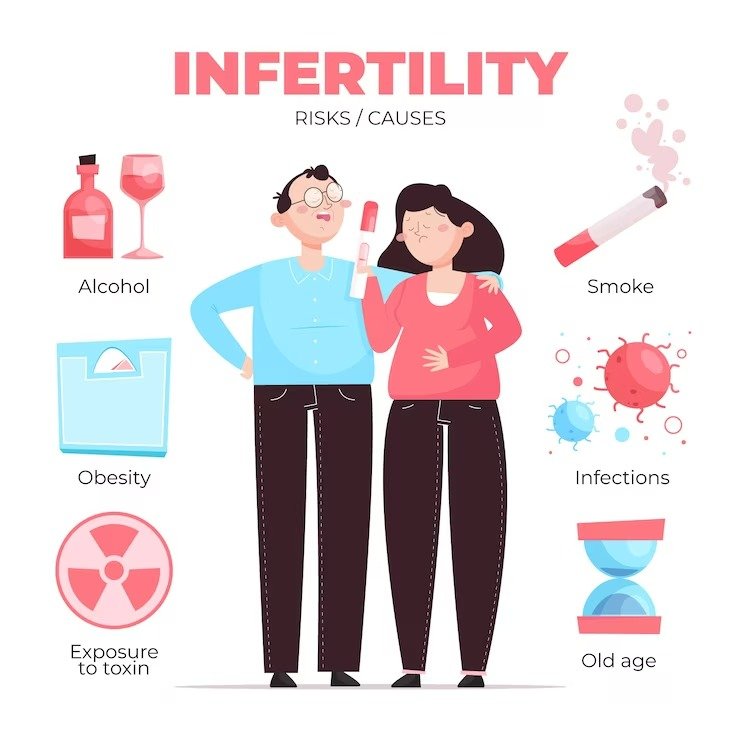
Read more to know how diabetes affects female infertility!
How does diabetes affect fertility in females?
- Women with diabetes may have shorter menstrual cycles. The reasons for this are late initiation of menarche and early menopause. Diabetes has been linked to menstruation irregularities like oligomenorrhea and secondary amenorrhea during the reproductive years.
- Diabetes may lead to Anovulation that is no ovulation. Diabetes and infertility in females are connected in many ways. The irregular periods in diabetic females lead to changes in Gonadotropin-releasing hormone secretion. This results in reduced levels of luteinizing hormone secretion which is important in reproduction.
- Also diabetes produces some antibodies which are fatal for the male sperms that enter the female body.
- 50%-70% of women who have diabetes are also likely to have PCOS (Polycystic ovarian syndrome). This is one of the potential obstructions in conception and fertility as the number of androgenic hormones is comparatively high in women with PCOS.
As per Ms. Kimberly Gomer, the Dietitian (RDN) with an experience of more than 10 years.
“Women with diabetes often experience lower rates of fertility than women who do not. There are multiple factors associated with diabetes that can make it a challenge for women to achieve a pregnancy. These include being overweight, having diabetic complications, having PCOS (Polycystic Ovary Syndrome), or having an autoimmune disease. PCOS is a common hormonal condition that affects fertility and leads to irregular or absent periods. PCOS is largely associated with Type 2 diabetes and Obesity.”
Take the first step to recovery. Get in touch with us for your treatment.
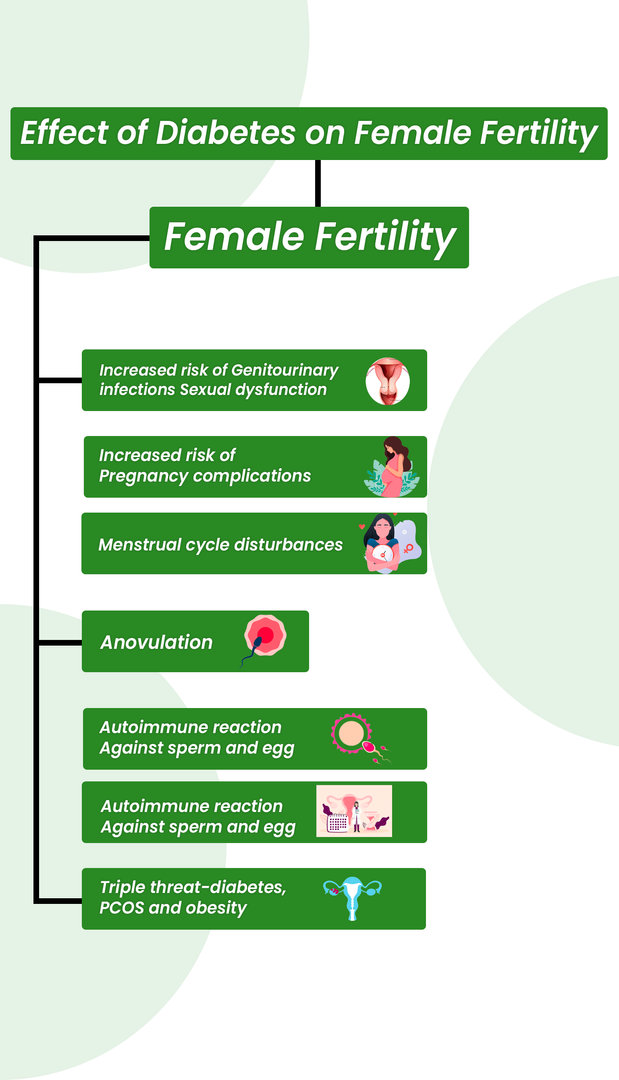
There are many ways to treat infertility in women. Let's have a look at the options:

Among all the above infertility treatments, IVF is now the most preferred one throughout the world.
What are you thinking? Whether IVF can be affected by diabetes or not?
Well, we've got you covered. It may have the chance to affect, but with the consultation of experienced medical professionals and treatment at top-notch facilities, the chances of failure are reduced.
Let's read ahead to know more in detail.
Can diabetes affect IVF treatment?
Studies have shown that women with diabetes have lower success rates with IVF treatments than those without diabetes. This could be due to the impact of diabetes on the quality of the eggs and uterus lining.
The risks of miscarriage, low birth weight, premature delivery, preeclampsia, possibilities of a C-section, etc. can increase with diabetes. Moreover, diabetes can increase the risk of complications during pregnancy, such as preterm labor and gestational diabetes.
If you have diabetes and are planning to undergo IVF, it is important to choose highly skilled and experienced IVF doctor to manage your diabetes and optimize your overall health. This can include adjusting your diabetes medications, monitoring your blood sugar more closely, and making dietary and lifestyle changes to improve your health.
During the IVF process, it is important to monitor your blood sugar levels closely, especially during the hormone stimulation phase. Hormones used during IVF can affect your blood sugar levels, so you may need to adjust your diabetes medications or insulin dosage accordingly.
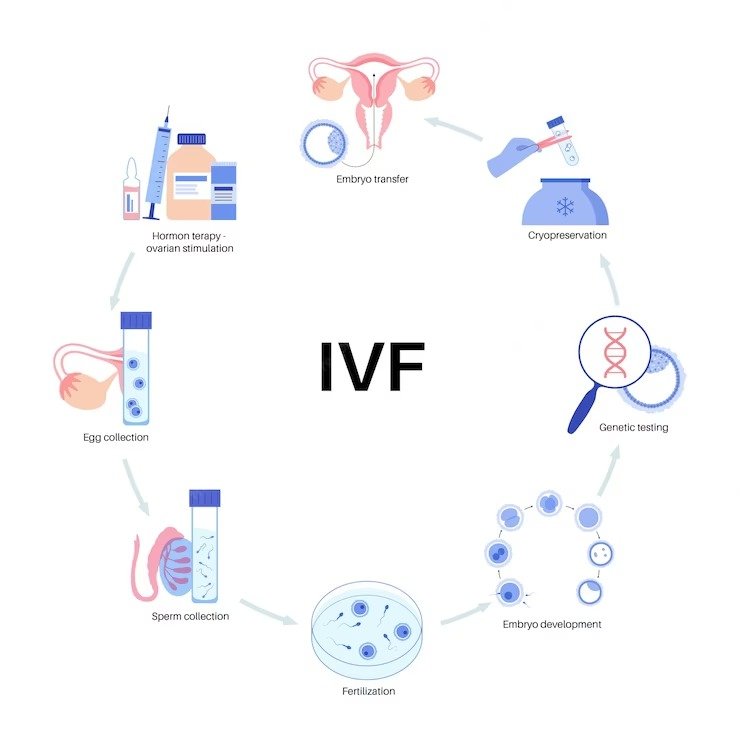
How diabetes can affect sperm quality and quantity?
Diabetes and Infertility in males are very common comorbidities. Men with diabetes have sperms with structural defects where nuclear and mitochondrial DNA are fragmented. The sperms also have reduced motility. Also, diabetes in males reduces their sexual drive as well and also causes erectile dysfunction in men.
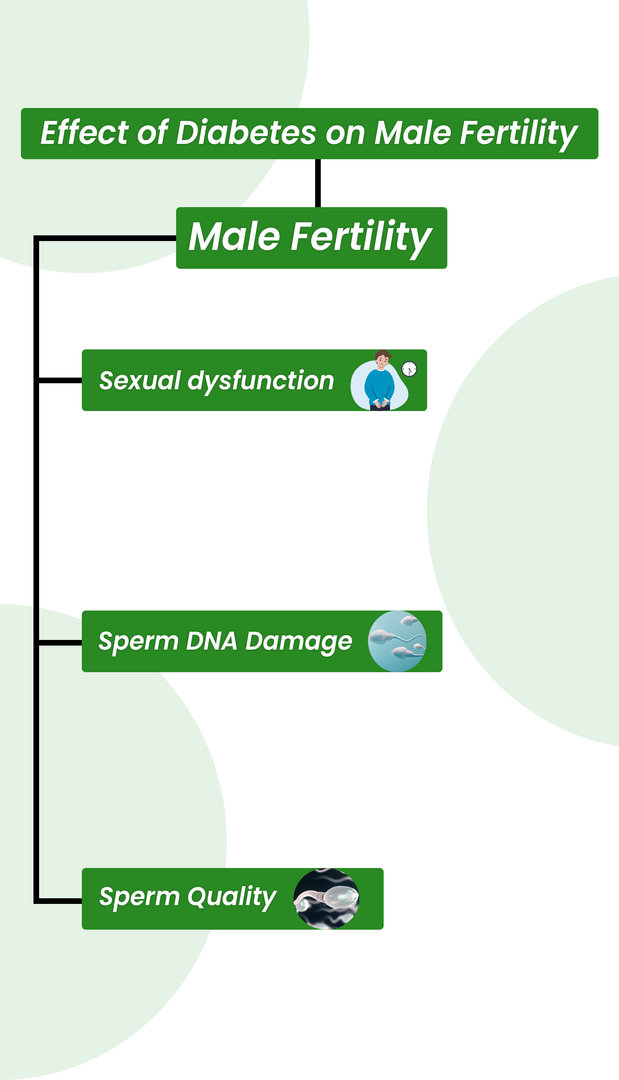
Can diet affect infertility due to diabetes?
According to experts, bad dietary habits are a major cause of diabetes and infertility. Poor diet mostly contains a lot of sugars and simple carbohydrates. This can cause insulin intolerance and other issues giving rise to infertility.
Ms. Melissa Wasserman states that:
“Yes, diet can affect infertility due to diabetes. Eating a balanced diet that is low in refined carbohydrates and high in fiber, healthy fats, and lean protein can help manage blood sugar levels and improve overall health. This can improve fertility in both men and women with diabetes.”
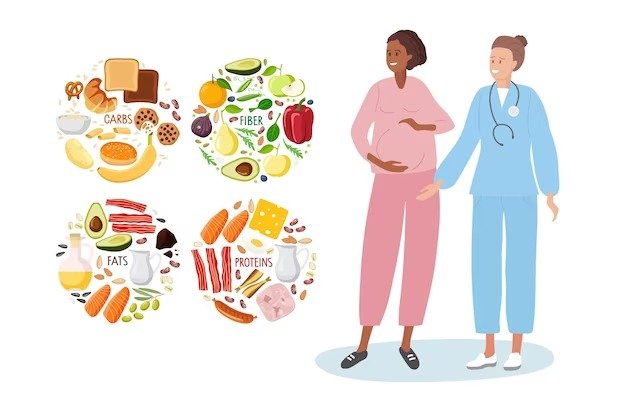
Unhealthy eating habits can also lead to weight gain in the long term, ultimately giving rise to diabetes, which in turn poses the risk of other health issues.
Small adjustments in your diet can have a significant impact on your reproduction and general health.
A healthy diet low in carbohydrates and high in proteins and fiber can assist in controlling blood sugar levels and improve fertility outcomes. Additionally, managing diabetes through regular exercise and adhering to the medications can increase fertility.
Take charge of your health and your life. Contact us today!

How can diabetes be managed to increase fertility?
Managing diabetes will cure the hormonal imbalances happening in the body. The hormonal imbalance causes reproductive issues.
Thus, mentioned below are the ways you can manage diabetes:
- Your doctor might recommend solutions like insulin or oral medicines. Sometimes, additional medical interventions, such as weight reduction procedures, may be suggested.
- Also, making dietary changes can help control diabetes to a huge extent. This is the most effective way of managing diabetes in the long run.
- While this is not diet advice, it can undoubtedly assist you in maintaining a healthy weight and hence maintaining normal blood sugar levels.
So, along with maintaining a healthy diet and healthy lifestyle, continuously undergoing fertility treatments and following the advice of the consultant is important to increase your chances of pregnancy.
Can diabetes and infertility be reversed?
Ms. Kimberly Gomer says that:
"In many cases – YES – Once blood sugar is reduced and lifestyle is improved by diet, stress management, sleep, and exercise – many fertility issues are solved. I have worked with many clients who have changed their diet and other lifestyle factors that result in not only improving their overall mental and physical health, but also helping them conceive. "
Both male and female reproduction may be impacted by diabetes. The impacts, however, can differ based on the extent and length of diabetes as well as the person's general health.
Diabetes can cause erectile difficulties in males. It also decreases sperm quantity and motility. Diabetes can decrease ovulation possibilities in women, leading to irregular menstruation periods. Additionally, pregnancy problems like gestational diabetes and pre-eclampsia may be more common in diabetic women.
The positive news is that controlling diabetes can increase the chances of conception. It is possible to improve reproductive health and raise the likelihood of conception. Maintaining stable blood glucose levels through dietary adjustments and medicine is the most variable option. In some circumstances, reproductive procedures like in vitro fertilization (IVF) may be a possible option.
Always consulting a healthcare professional is essential for managing diabetes and keeping an eye on any possible effects on conception.
For those with diabetes, adopting a healthy lifestyle with frequent exercise, a healthy weight, and no smoking can also have a positive impact on fertility results.
Your health is too important to ignore – schedule your appointment now.
References:
https://www.medpagetoday.com/reading-room/endocrine-society/diabetes/71752






